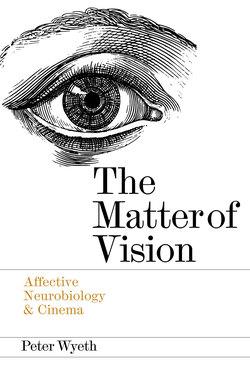Читать книгу The Matter of Vision - Peter Wyeth - Страница 9
На сайте Литреса книга снята с продажи.
The Wisdom of Vision
ОглавлениеVision may be vastly older and vastly more powerful than Language, but what I would like to draw attention to here again is the quality of Vision. There is a common view in my culture that it is Language that is the subtle medium, capable of the depths of expression of Shakespeare, while the visual sense, and in particular Cinema, is crude, obvious, and superficial. I would guess that part of that attitude comes from the fact that Language has to be practiced to gain its effects. We are more conscious of making an effort to manipulate it on a daily, hourly, constant basis. With Vision, as I have said, it is automatic, often unconscious and we are much less aware of any effort involved.
This conception has Vision as an intelligent medium. In other words it is not merely a passive vessel through which information passes, but an active mediator that has a role in identifying what is important to be looked at and passes back information it assembles about those things to the body/brain system in a constant feedback loop. Horace Barlow, twenty years after his 1953 experiment in frog vision sensed something similar: “a large part of the sensory machinery involved in a frog’s feeding responses may actually reside in the retina . . . each single neuron can perform a much more complex and subtle task than had previously been thought . . . the activities of neurons, quite simply, are thought processes”.18
The notion I want to develop here is that we do not realise the quality of information we receive from Vision. I suggest that everything we know we learn from Vision. It is not merely a question of the amount of information that we receive, although that is an indication of how much we are picking up, but of the depth, the intelligence, the sheer wisdom that Vision brings. What I mean to suggest by wisdom is that the nature of the knowledge gained from Vision goes far deeper than common currency would suggest. Wisdom suggests insight, perhaps combined with mature reflection. The wonder of Vision is that it is intelligent in the sense of making discriminations, judgements – just as in the first moments we lay eyes upon a new person – and those judgements would seem to involve millions, perhaps billions of discriminations. That means the brain19 making choices, according to biological criteria, what might be called instinctive, tacit, or natural wisdom – dare I say the best kind – rather than the rational Darwin’s List type,20 the formal kind of the Academy. It is worth stressing that the criteria of this wisdom are biological rather than sociological or philosophical. That means the discriminations are about survival (for reproduction). Evolution makes those choices solely on their being advantageous for survival. For the most part those discriminations are Automatic and do not appear in consciousness. This wisdom, this intelligence is unconscious.
My suggestion would be that many of the qualities we think come from Language in fact come from Vision.
As a prime example, I would contend that Thought takes place in Vision. Not only that but Thought only takes place in Vision.21 Thought does not take place in Language. Language translates what Vision provides into its own medium, but it is not a source of meaning, merely a medium of translation. Language is contingent upon Vision.
My thought is that virtually all the information we gain about other people comes from our Vision, and again mainly unconsciously. When we are told about somebody we compare that information to what we see of them, and it is that latter information that is decisive. The reason is that ‘seeing is believing’, we gain a much richer field of information in Vision, more complex, with more dimensions than anything Language can provide. What wisdom we have comes entirely from Vision. Intelligence is about the application of imagination to making distinctions and judgements. Imag-ination could almost be a synonym for Vision. Christian Keysers22 has shown us that the easy assumption of philosophers over the ages that we cannot know what is in another’s head is not quite true. On the contrary we cannot avoid knowing, not in the literal sense of seeing thoughts but in empathising with what they are going through emotionally and mirroring that unconsciously in our emotions through what he has called Shared Circuits.
Those processes also obtain in Cinema as we watch people on the screen. We gain less intimate information than being in somebody’s company, but what films show us is people in action, with a far broader range of actions than we would normally experience with an individual, the process of drama, the intensified emotions of actors seen on a bright screen in a darkened room.
